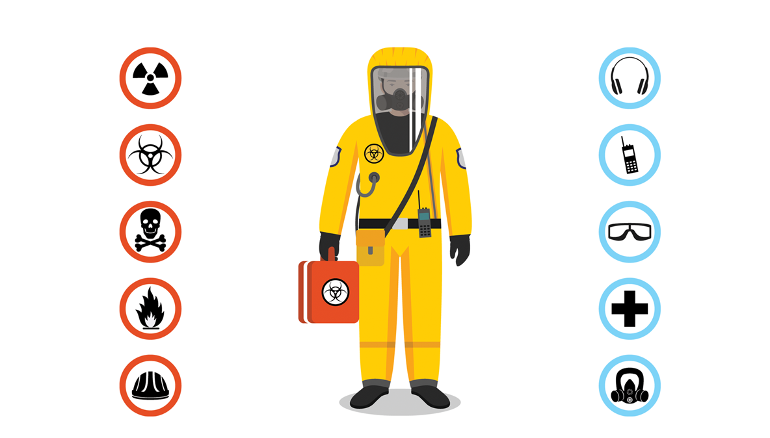Common Workplace Hazards in Oman and How to Address Them

Oman, with its growing economy and diverse industries, is a hub of business and employment opportunities. However, along with these opportunities come workplace hazards that employees and employers alike must be aware of to ensure a safe and productive environment. In this blog, we'll explore some common workplace hazards in Oman and discuss how they can be effectively addressed.
Heat Stress in Outdoor Industries
Oman's climate is known for its high temperatures, especially during the summer months. Industries such as construction, agriculture, and oil and gas often require outdoor work, putting workers at risk of heat stress and related illnesses. To address this hazard, employers should provide shaded rest areas, frequent breaks, and ample hydration. Personal protective equipment (PPE) like lightweight, breathable clothing and sun hats should also be encouraged.
Fall Hazards in Construction
Construction is a vital sector in Oman, but it also poses significant risks. Working at heights without proper safety measures can lead to severe injuries or fatalities. Employers must ensure that scaffolding, guardrails, and harnesses are properly installed and used. Regular safety training and awareness campaigns can help educate workers about the importance of fall prevention.
Chemical Exposure in Industrial Settings
Industries involving chemicals, such as manufacturing and refineries, carry the risk of chemical exposure. Employers should provide adequate training on proper handling, storage, and disposal of chemicals. Personal protective equipment, like gloves, goggles, and respirators, should be provided to minimize exposure risks. Proper ventilation systems and regular monitoring are essential to maintaining a safe environment.
Ergonomic Concerns in Office Environments
While office jobs might seem less hazardous, ergonomic issues can lead to long-term health problems. Poor posture, improper seating, and repetitive motions can cause musculoskeletal disorders. Employers can address this by providing ergonomic furniture, promoting regular breaks, and conducting workstation assessments. Employees should also be educated about proper posture and stretching exercises.
Electrical Hazards
Electrical hazards are a concern across various industries. Faulty wiring, overloaded circuits, and inadequate grounding can lead to electrical shocks, burns, or even fires. Employers should ensure that electrical systems are inspected regularly and comply with safety standards. Proper training on electrical safety, including identifying potential hazards, can empower workers to take necessary precautions.
Traffic Accidents in Transportation and Logistics
With Oman's developing transportation and logistics sectors, the risk of traffic accidents involving vehicles and equipment has increased. Employers should enforce strict traffic rules within workplaces, provide proper training for vehicle operators, and establish designated walkways for pedestrians. Regular vehicle maintenance and safety checks are also crucial.
In conclusion, workplace hazards in Oman span a range of industries and environments. Employers, employees, and regulatory bodies must collaborate to address these risks effectively. Regular safety training, proper equipment, and a strong safety culture can go a long way in preventing accidents and creating a safer workplace for everyone.
Blog 2: Prioritizing Workplace Safety: Common Hazards in Oman's Industrial Landscape
Oman's industrial landscape has evolved significantly over the years, contributing to the nation's economic growth. However, alongside this growth, the need for increased awareness and vigilance regarding workplace safety has become paramount. In this blog, we'll delve into some of the most common hazards that exist within Oman's industrial workplaces and explore ways to prioritize safety.
Confined Space Dangers
Industries such as manufacturing, oil and gas, and mining often involve working in confined spaces. These spaces can harbor hazardous gases, lack proper ventilation, and pose risks of entrapment. Employers must conduct thorough risk assessments before allowing entry into confined spaces. Adequate ventilation, proper gas monitoring, and confined space training are crucial to preventing accidents.
Machinery and Equipment Risks
Oman's industrial sectors rely heavily on machinery and equipment to facilitate operations. Inadequate maintenance, lack of training, and failure to use safety guards can result in serious injuries. Employers should ensure that workers are properly trained to operate machinery, conduct regular maintenance checks, and follow lockout/tagout procedures to prevent unauthorized equipment use.
Fire and Explosions
Industries like refining, manufacturing, and chemical production are susceptible to fire and explosion hazards due to the presence of flammable substances. Implementing strict fire prevention measures, including proper storage of flammable materials, installing firefighting equipment, and conducting fire drills, is essential. Employees should also receive fire safety training to respond effectively in emergencies.
Manual Handling and Musculoskeletal Disorders
Manual handling tasks, such as lifting, carrying, and pushing heavy objects, can lead to musculoskeletal disorders. Industries like construction, logistics, and warehousing are particularly prone to these hazards. Employers should educate workers about proper lifting techniques, provide mechanical assistance when possible, and establish ergonomic guidelines for minimizing strain.
Noise-Induced Hearing Loss
Many industries, including construction and manufacturing, expose workers to high noise levels that can lead to permanent hearing loss. Employers should conduct noise assessments to identify hazardous areas and provide appropriate hearing protection devices. Regular health checks to monitor hearing health can help detect issues early on.
Chemical Exposure and Respiratory Hazards
Workplaces dealing with chemicals, paints, solvents, and other hazardous substances can expose workers to respiratory risks. Employers must provide appropriate respiratory protection, ensure proper ventilation, and implement comprehensive chemical safety training. Understanding the proper use of PPE and emergency response procedures is crucial in these environments.
Promoting a culture of safety and fostering collaboration between management and workers is vital to addressing these hazards effectively. Regular safety audits, hazard assessments, and continuous training are instrumental in mitigating risks and ensuring that Oman's industrial workplaces prioritize the well-being of their workforce.